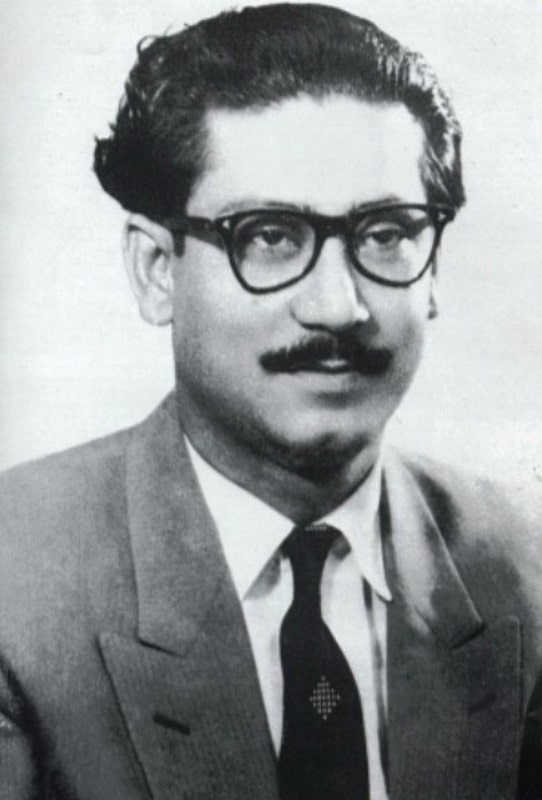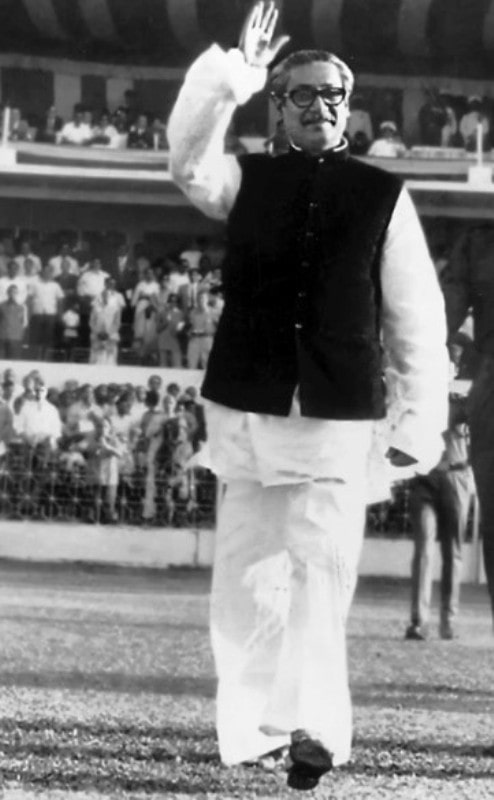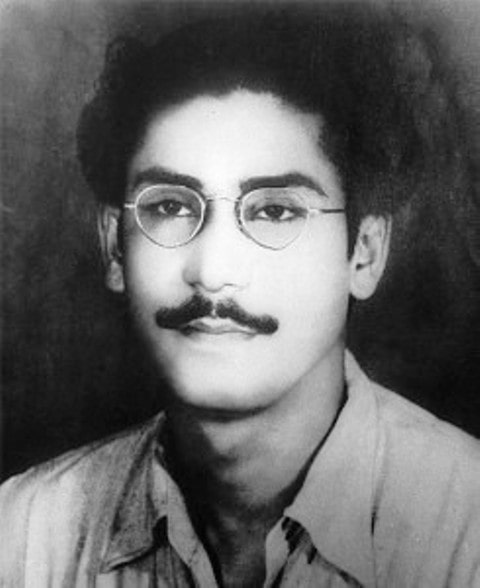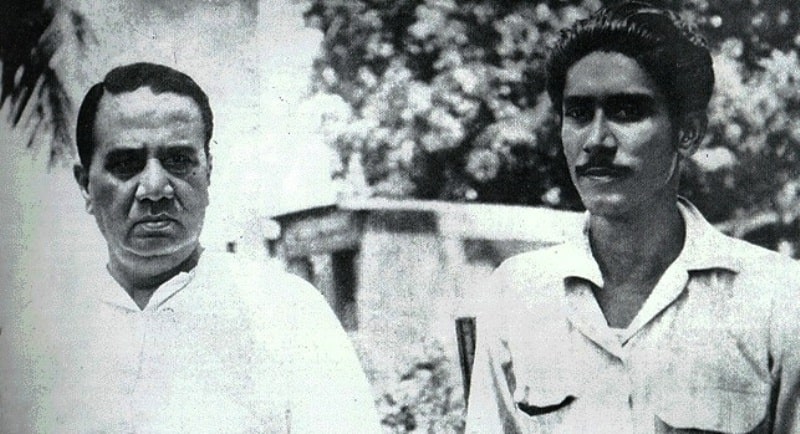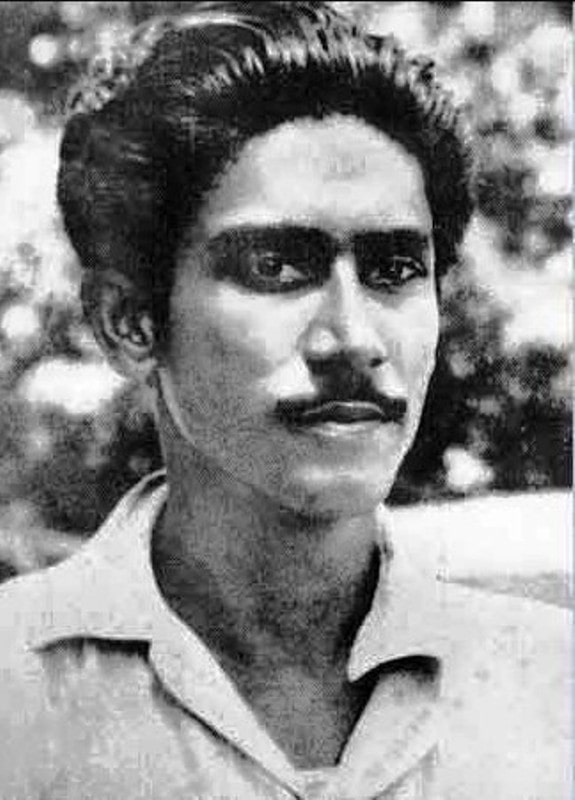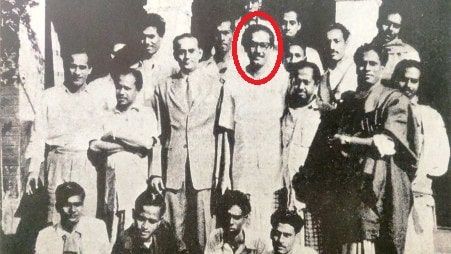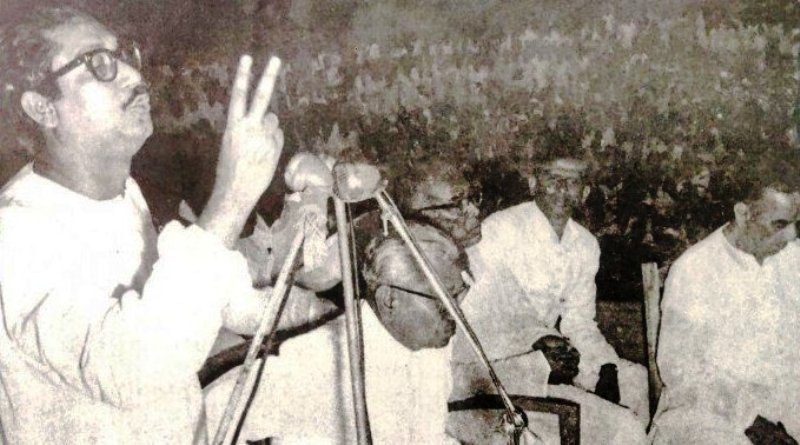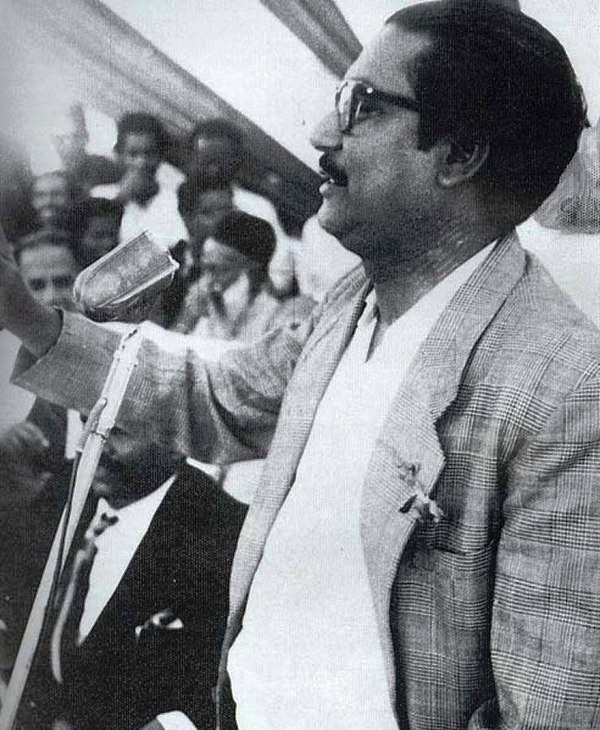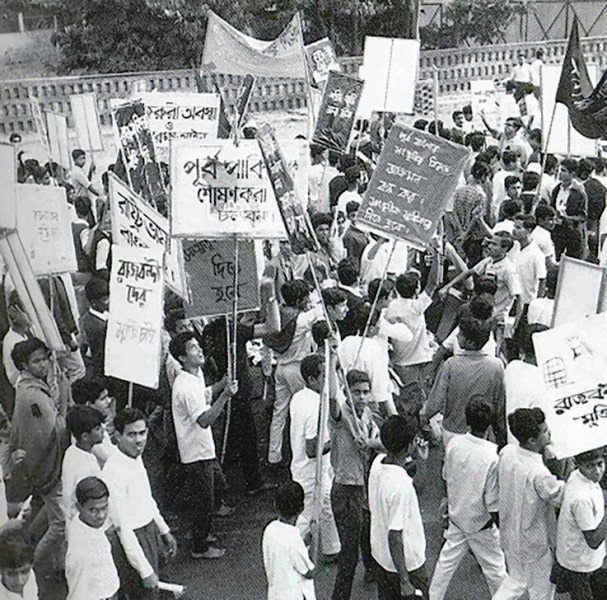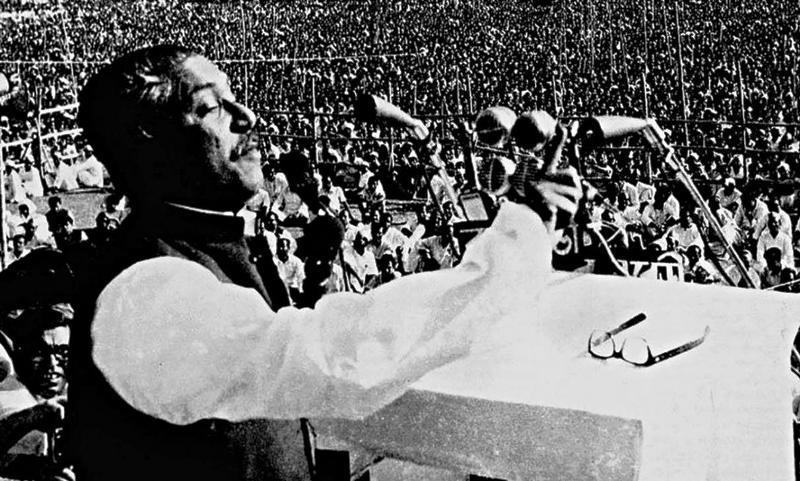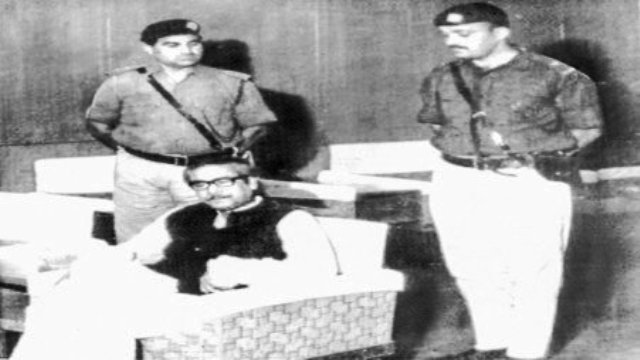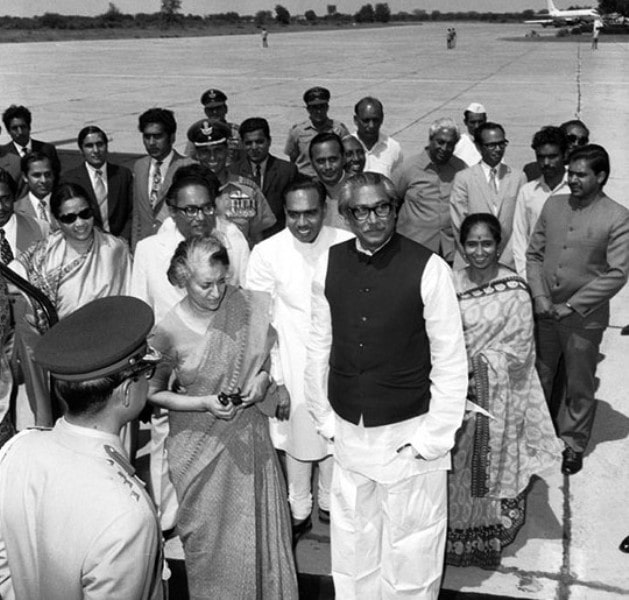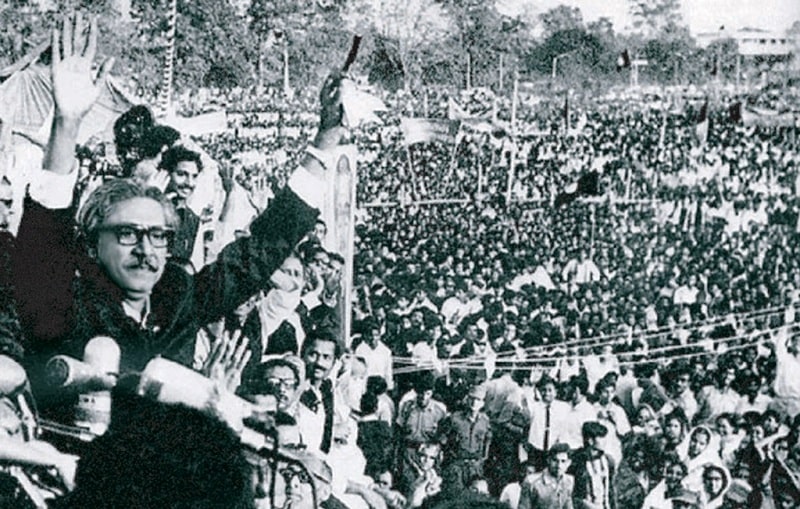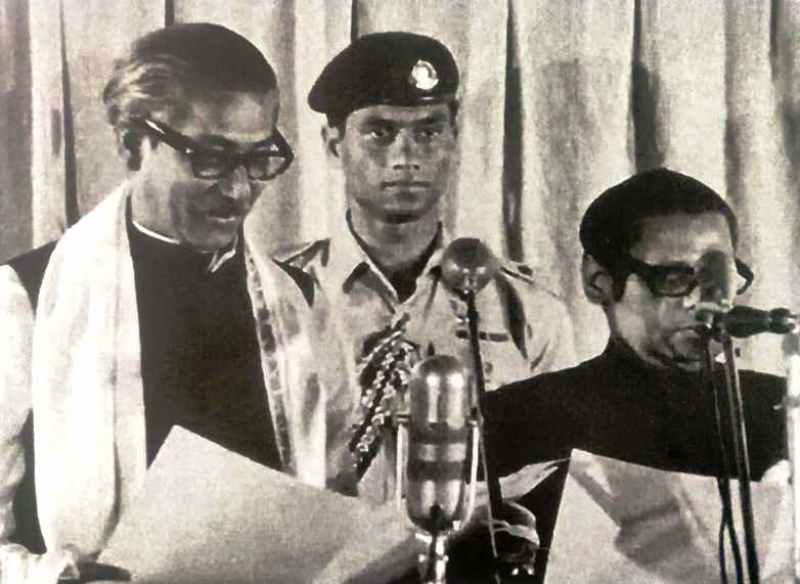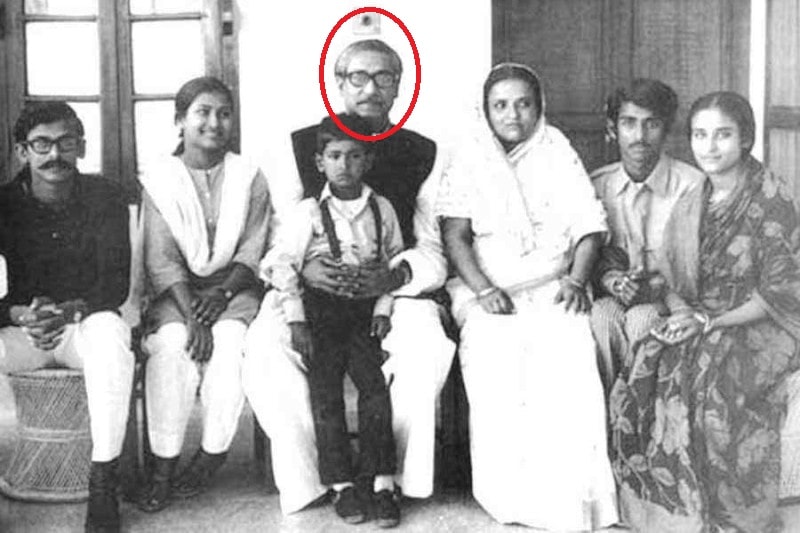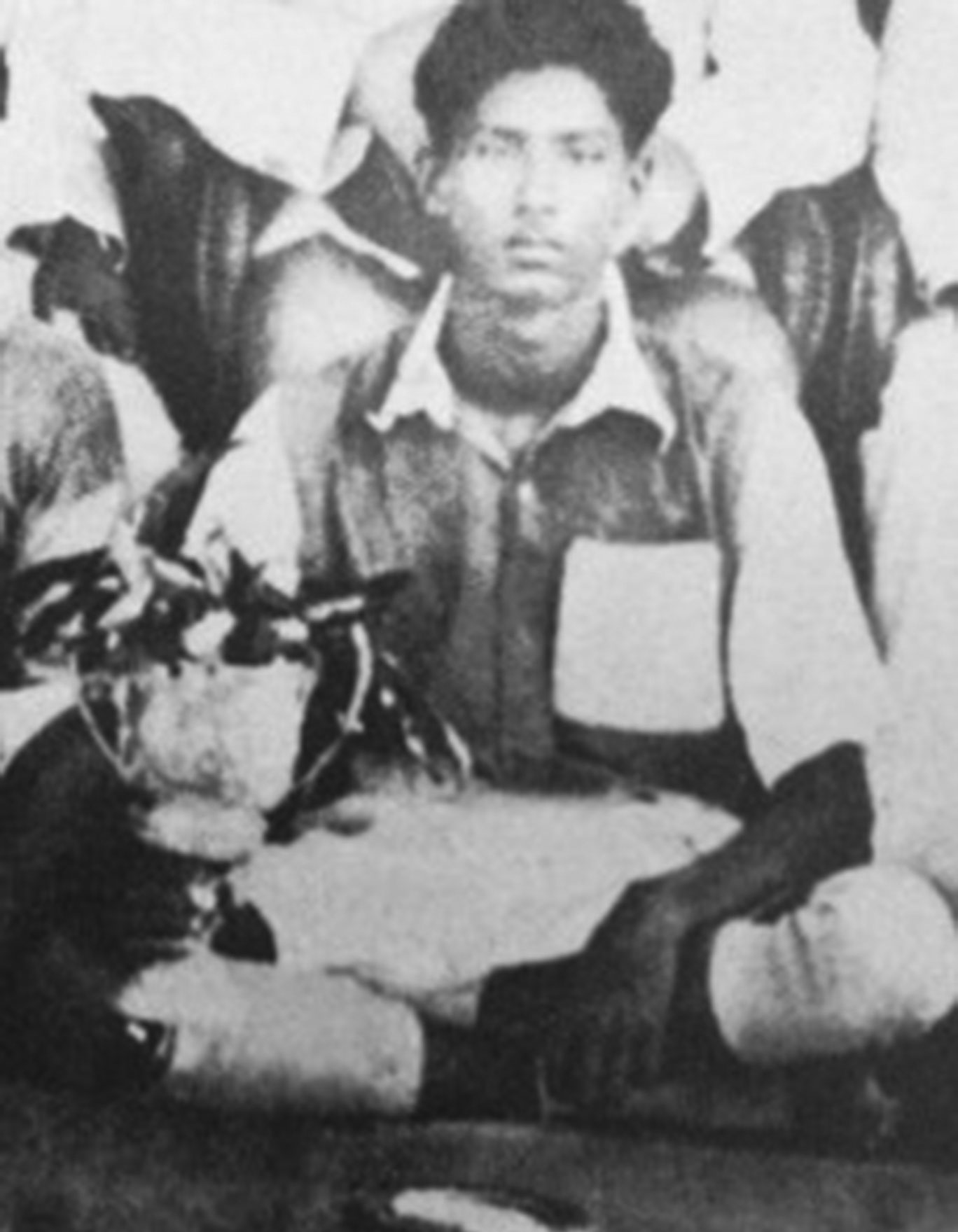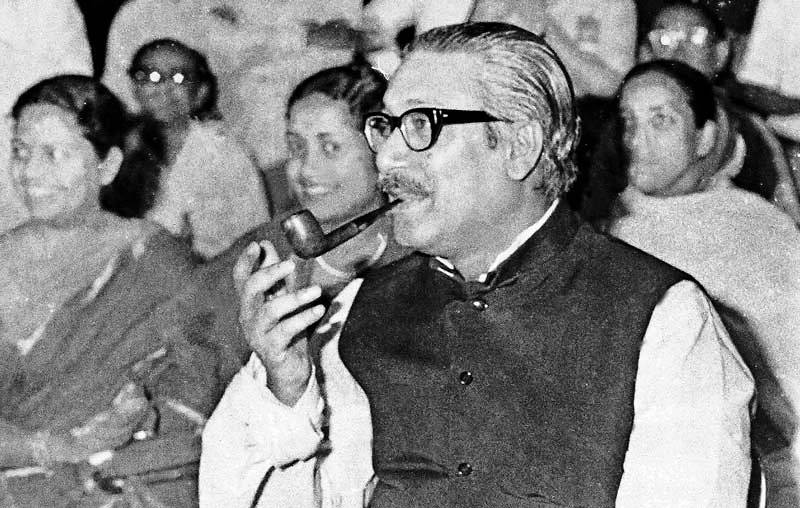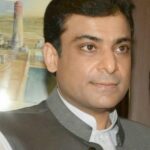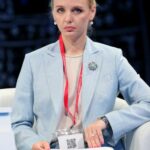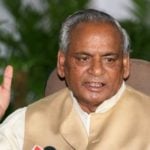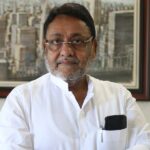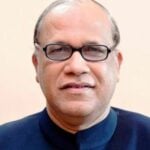Sheikh Mujibur Rahman Height, Age, Death, Wife, Family, Biography & More
| Bio/Wiki | |
|---|---|
| Name Earned | • Bangladesh's Father of the nation [1]Bangladesh High Commission Brunei • Bangabandhu [2]Indiatimes.com |
| Nickname | Khoka [3]The Korea Post |
| Profession | Politician |
| Famous For | • Architect of the freedom struggle of Bangladesh |
| Physical Stats & More | |
| [4]Dhaka Tribune Height | in centimeters- 180 cm in meters- 1.80 m in feet & inches- 5’ 11” |
| Eye Colour | Dark Brown |
| Hair Colour | Salt and pepper |
| Politics | |
| Political Party | • All India Muslim Student Federation (1940-1943) • Muslim League (1943-1949) 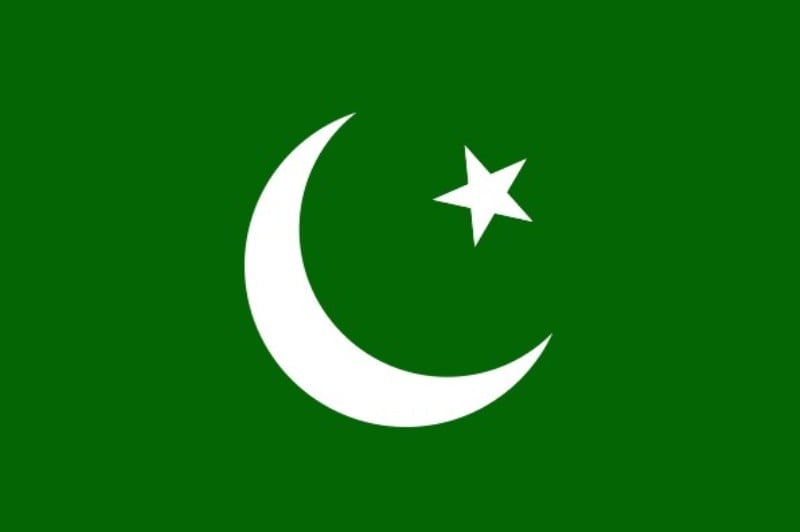 • East Pakistan Awami Muslim League (1949-1975) 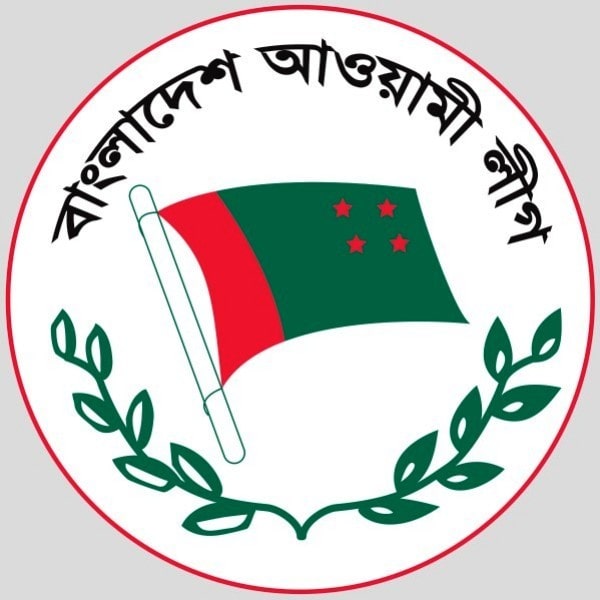 Note- The East Pakistan Awami Muslim League was renamed as Awami League in 1963 when Mujib became the President of the party. |
| Political Journey | • In 1940, he joined the All India Muslim Student Federation. • In 1943, he joined the Bengal Muslim League. • In 1946, he was elected as the general secretary of the Islamia College Students Union. • In 1946, he worked closely with Huseyn Shaheed Suhrawardy, during the pre-partition riots in Calcutta. • In 1948, he founded the East Pakistan Muslim Students’ League. • In 1949, he joined the East Pakistan Awami Muslim League. • In 1949, he was elected as the joint-secretary of the East Pakistan Muslim Awami League. • In 1953, he was elected as the general secretary of the Muslim Awami League. • In 1954, he was appointed as the Agricultural Minister; but the entire government was dissolved, as a result of which he lost his appointment. • In 1956, he was made a part of the Second Constituent Assembly of Pakistan. • In 1961, he established the Free Bangla Revolutionary Council while he was in jail. • In 1963, he was elected as the President of the East Pakistan Muslim Awami League. • In 1963, he renamed the party to Awami League. • In 1964, he supported Fatima Jinnah during the Presidential Elections against President Ayub Khan. • In 1966, he put forward the 6 point demand of the Muslim League at Lahore. • In 1968, he along with his followers were arrested for the Agartala conspiracy case. • In 1969, he rejected Jinnah's two-nation theory. • In 1970, his party secured a sweeping majority in East Pakistan, but could not form a government as the national assembly was dissolved by the President. • In 1971, he called for the independence of Bangladesh in a speech. • In 1971, he was arrested and flown to West Pakistan under detention. • In 1972, he came back to Bangladesh after the liberation war and was sworn in as the first Prime Minister of the country. • In 1975, he and his followers amalgamated to form a new political party known as Bangladesh Krishak Sramik Awami League also known as BaKSAL. |
| Awards, Honours, Achievements | • 1973: Julio-Curie award for Peace was given to Mujib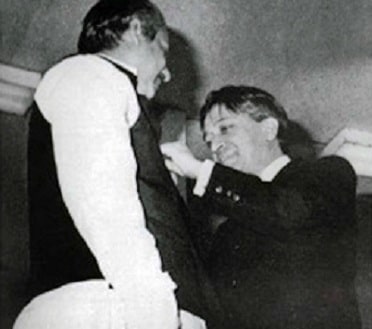 • 2016: Sheikh Mujibur Rahman's bust was unveiled in London 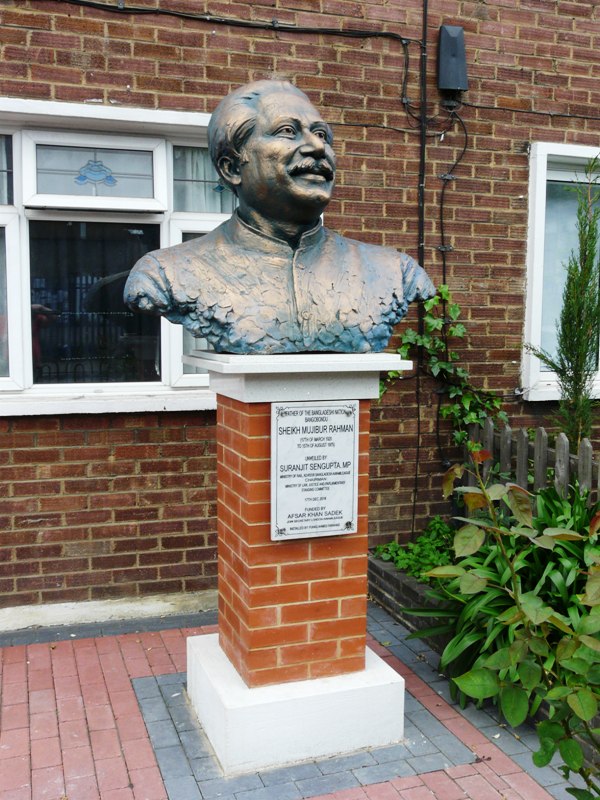 • 2019: Turkey named a residential avenue after Mujib to honour him. 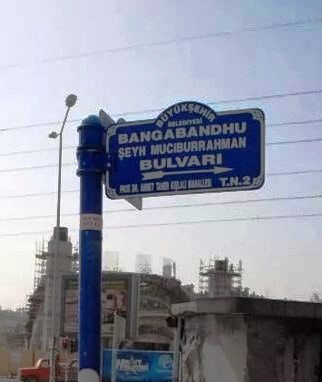 • 2020: The year 2020 marked the hundredth birth anniversary of Shiekh Mujibur Rahman and was celebrated as the Mujib Year in Bangladesh. • 2020: The government of India released a postal stamp on the occasion of Mujib Year. 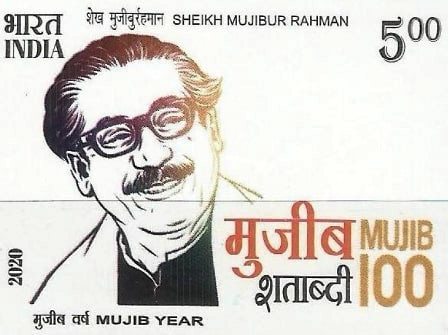 • 2021: Mahatma Gandhi Peace Prize Award by the Government of India. 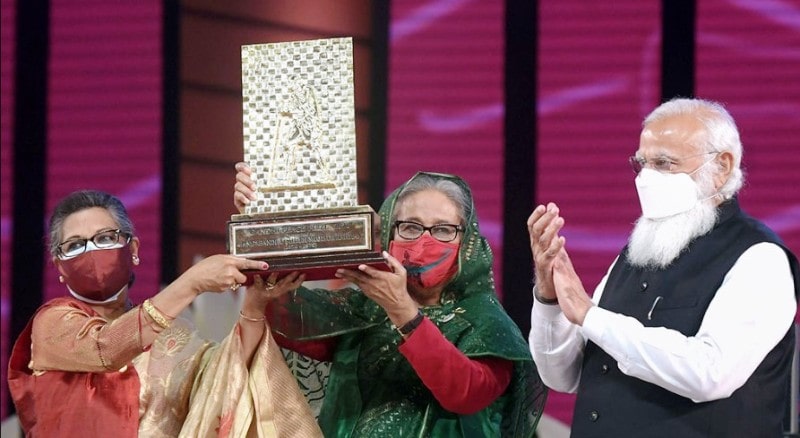 • 2021: Bangabandhu Chair was established by Delhi University and the Indian Council for Cultural Relations (ICCR). • 2021: In the field of Creative Economy, the government of Bangladesh and the UN have initiated the Bangabandhu Sheikh Mujibur Rahman International Prize. •2021: A bust of Mujib was inaugurated in Ankara, the capital of Turkey. 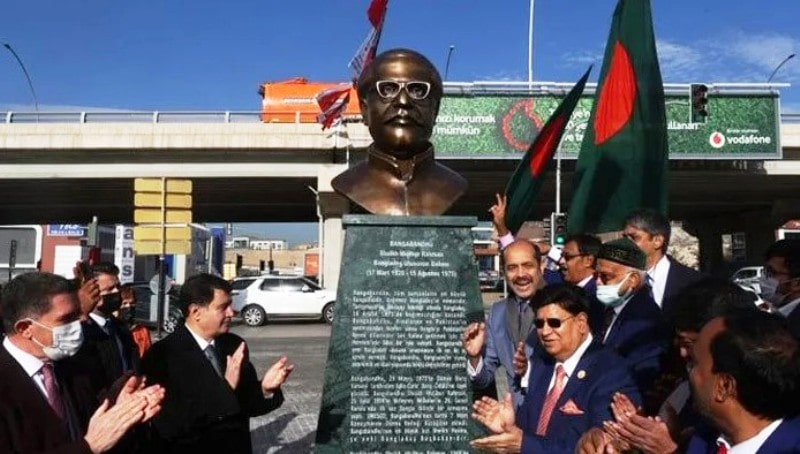 |
| Personal Life | |
| Date of Birth | 17 March 1920 (Wednesday) |
| Age (at the time of death) | 55 Years |
| Birthplace | Tungipara village, Gopalganj district, Province of Bengal, British India (now Bangladesh) |
| Date of Death | 15 August 1975 |
| Place of Death | Dhaka, Bangladesh |
| Death Cause | Assassination [5]NDTV |
| Zodiac sign | Pisces |
| Signature |  |
| Nationality | • British Indian (1920 - 1947) • Pakistani (1947 - 1971) • Bangladeshi (1971 - 1975) |
| Hometown | Tungipara village, Gopalganj district, Bangladesh |
| School | • Gimadanga Public School (1927) • Gopalganj Public School (1929) • Madaripur Islamia High School (1931) • Gopalganj Missionary School (1942) • Islamia College (1942) |
| College/University | • Islamia College (1944) • Dhaka University; but could not complete his further studies (1947) |
| Educational Qualification | Bachelor of Arts [6]Embassy of Bangladesh, Washington DC |
| Religion | Islam [7]Telegraph India |
| Address | Bangabandhu Bhaban, House Number 10, Road Number 32 (Old), 11 (New), Dhaka – 1209, Bangladesh. Note- His house of residence has been converted into a National Memorial Museum. |
| Controversies | • Mujib was accused of suppressing and killing his political rivals. He is said to have killed more than 40,000 people. The killings were done by a political militia, Jatiyo Rakkhi Bahini and the Bangladeshi Army. [8]Extrajudicial Killing in Bangladesh: A Murder of Human Rights by A.Z.M. Habib • Mujib was accused of appointing his close relatives and family members, at several high-ranking posts in the government. [9]Bangladesh: Era of Sheikh Mujibur Rahman by Moudud Ahmed • Mujib is said to have given special commercial passes to his relatives. He allowed his relative, Sheikh Fazlul Haque Mani, to conduct business with India, privately; despite a ban on trade with India due to slow inflation in Bangladesh. [10]Bangladesh: Past and Present by Salahuddin Ahmed • Mujib is also accused of saving the Youth leader of the Awami League from the charges of rape. [11]Bangladesh: A Legacy of Blood by Anthony Mascarenhas • Mujib is also said to have preferred Mukti Bahini over the army, in giving higher posts in the government. [12]Londoni • Mujib's eldest son, Sheikh Kamal was accused of being shot while attempting a bank robbery. The matter was suppressed by Mujib from the public. [13]Asian Thought & Society: An International Review Volume XI by J. H. Ignatius • Mujib was also accused of sending his younger son, Sheikh Jamal to Sandhurst Military Academy, in UK, by by-passing the selection process; so as to have a better control over the army. It was also rumored that Jamal would be directly appointed as a Lieutenant Colonel; at a very important post. [14]Londoni |
| Relationships & More | |
| Marital Status | Married |
| Marriage Date | Year, 1938 |
| Family | |
| Wife/Spouse | Sheikh Fazilatunnesa Mujib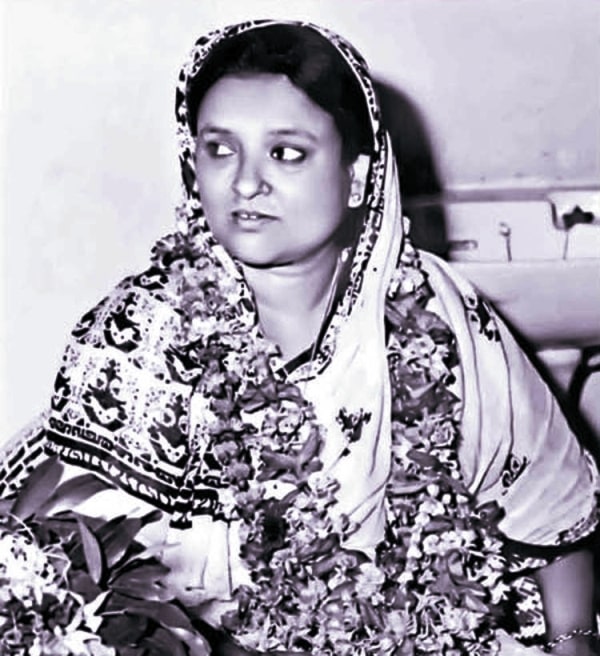 |
| Children | Son(s)- 3 • Sheikh Kamal (elder) (retired as a Captain from the Bangladesh Army) 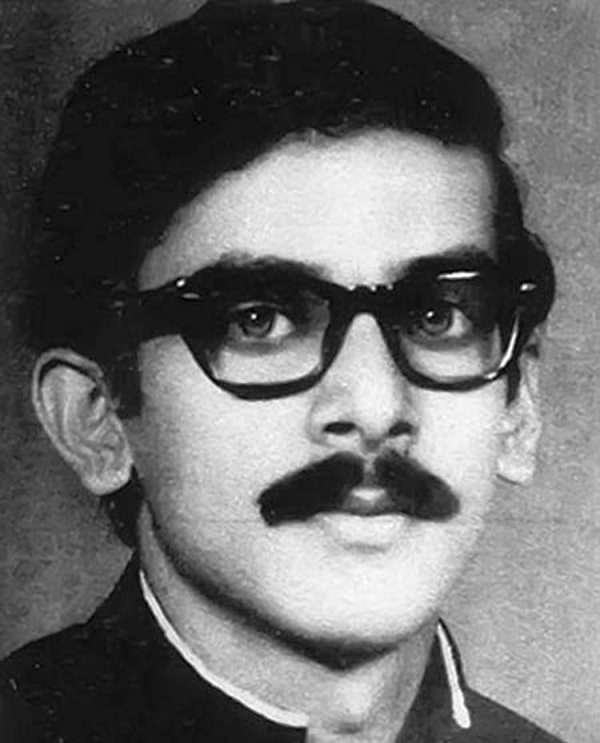 • Sheikh Jamal (younger) (an officer in the Bangladesh Army) 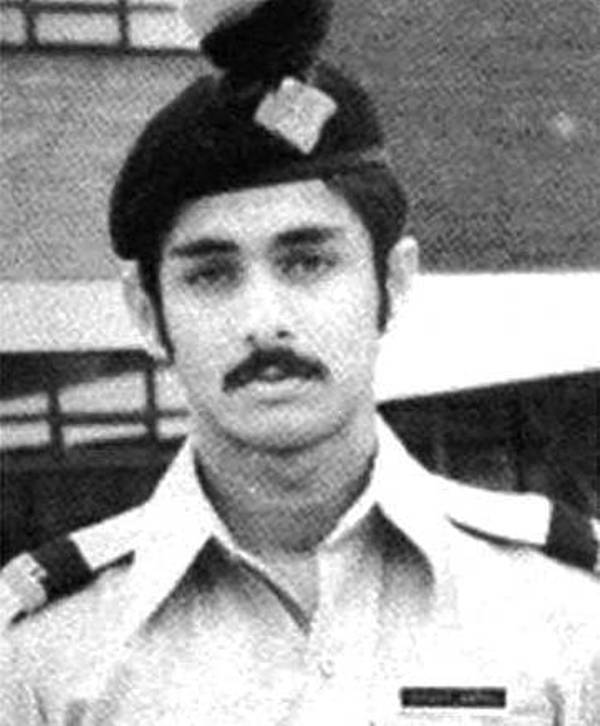 • Sheikh Russel (youngest) 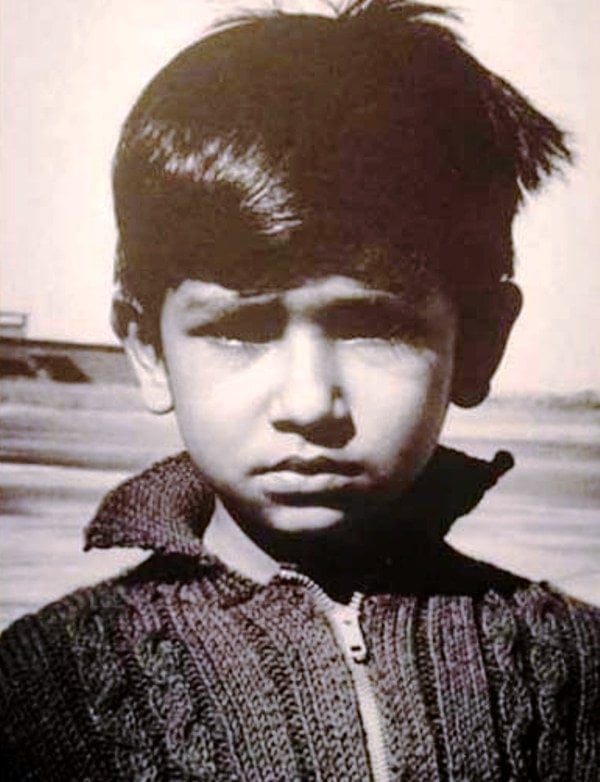 Daughter(s)- 2 • Sheikh Hasina (eldest among all) (Prime Minister of Bangladesh) 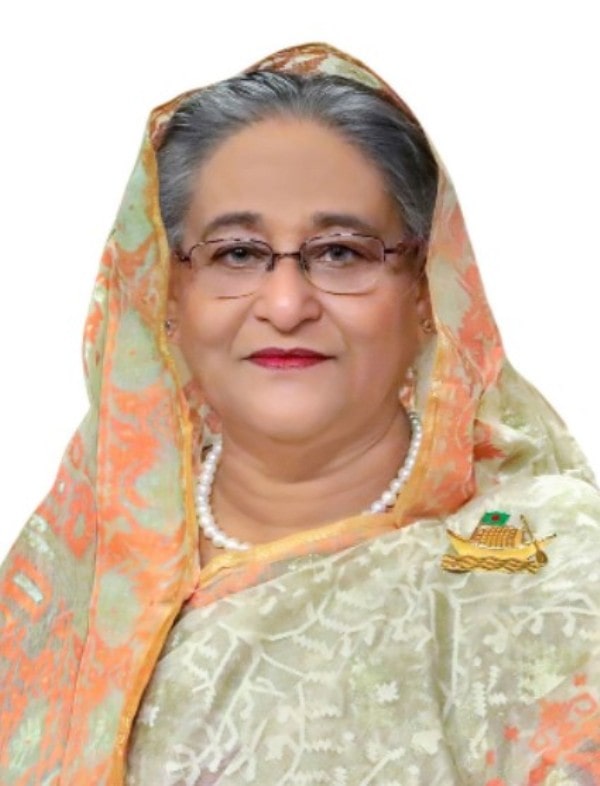 • Sheikh Rehana (younger) (a politician) 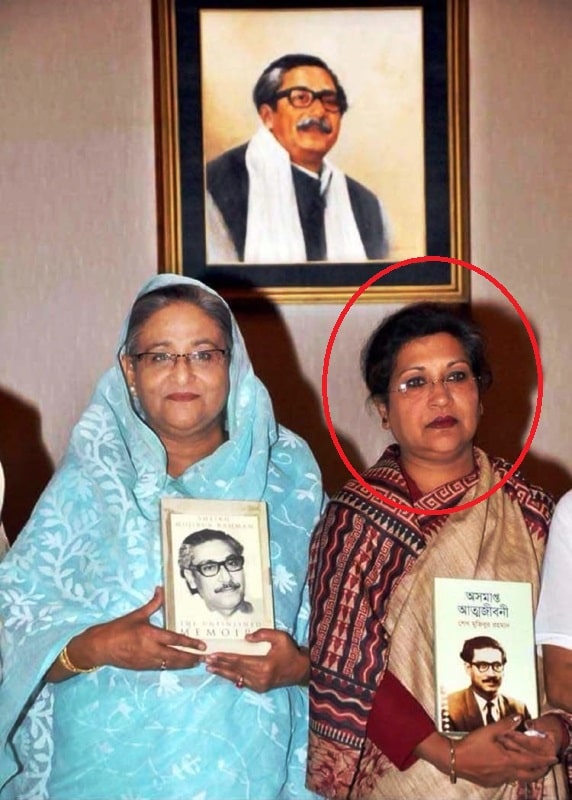 |
| Parents | Father- Sheikh Lutfur Rahman (a court official during the British Raj)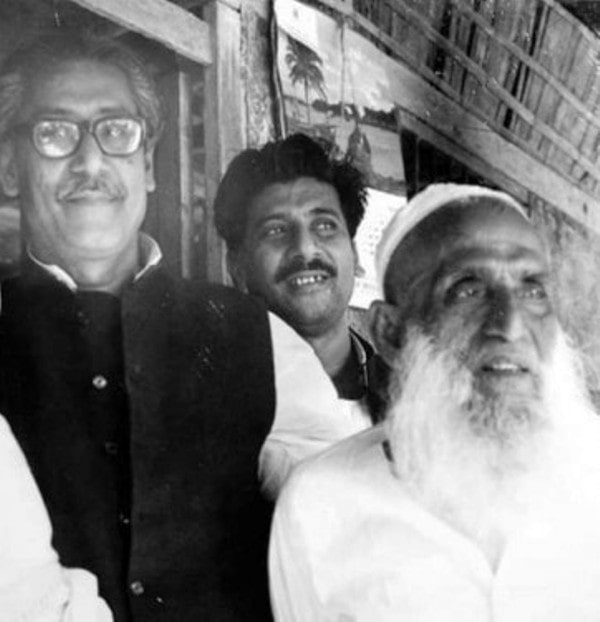 Mother- Sayera Khatun 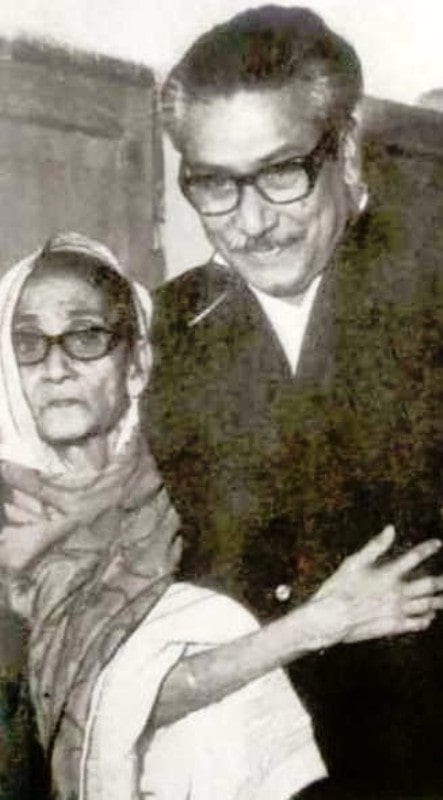 |
| Siblings | Brother- 1 • Sheikh Abu Naser (younger) 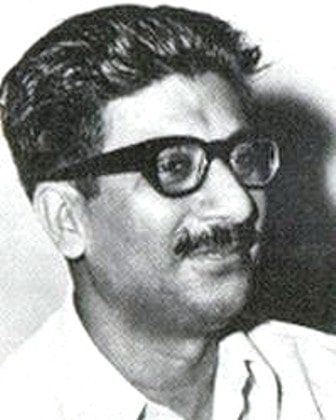 Sisters- 4 • Sheikh Fatema Begum • Sheikh Asia Begum • Sheikh Amena Begum • Khadijah Hossain Lily |
Some Lesser Known Facts About Sheikh Mujibur Rahman
- Sheikh Mujibur Rahman (1920-1975) was the first Prime Minister of Bangladesh. He is also called, the father of the Nation of Bangladesh. The entire Bangladesh Liberation struggle was his brainchild. Sheikh Mujibur Rahman was also the President of the political party, Awami League. He died on 15 August 1975, after Mujib, along with his family members, was assassinated at his residence.
- After being admitted to the Gopalganj Public School, Mujib showed early signs of leading people. In 1929, he organised a peaceful protest in the school against the poor conduct of the school’s principal.
- Mujib, in 1931, was enrolled in the Madaripur Islamia High School, and in 1934, he had to leave his studies; as he underwent a very complicated eye surgery. Mujib recovered from the surgery, but it took a lot of time to heal. In his autobiography, Sheikh Mujibur Rahman wrote,
The doctor recommended an eye operation, stressing that any delay could make me blind. He had me admitted to Calcutta Medical College Hospital. I was scheduled for surgery at 9 a.m. I was so scared that I tried to run away but did not succeed. I was taken to the operating theatre for surgery on one eye. Within ten days there was another surgery on the other eye. I eventually recovered but had to wear glasses from then on. That is why I have had glasses since 1936. I also had to discontinue studies for a while.” [15]The Unfinished Memoirs by Sheikh Mujibur Rahman
- Mujib’s political career began early, in 1940, he joined the All India Muslim Student Federation, and in 1943, he joined the Bengal Muslim League, from where Mujib openly supported the demand for a separate country called Pakistan, which was put forward by the Muslim League.
- Owing to his great leadership capabilities, Mujib, while completing his graduation, was elected as the General Secretary of the Islamia College Students’ Union.
- In 1946, Shaheed Suhrawardy, the founder of the Awami League, recognised the talents of Mujib. He cultivated a close and cordial relationship with Mujib. Both, Mujib and Suhrawardy, worked closely with one another during the 1946 pre-partition movement.
- In 1947, when the British left India. India was divided into two parts, Pakistan and India. Pakistan encompassed two major provinces called, East and West Pakistan. East Pakistan was formerly called East Bengal, which had voted in favour of being a part of Pakistan.
- Mujib completed his graduation in 1947 and, later on, joined Dhaka University, so as to complete his post-graduation in law. Although Mujib was not interested in pursuing law as a subject for his post-graduation. In his memoirs, he wrote,
I stayed back in our village home for a few days. My father was very upset when he heard that I didn’t want to study law at Dhaka University any more. He said, ‘If you don’t want to continue your studies at the university go to England and get a bar at law degree from there. If necessary, I will sell my land to finance your studies.’ I said, What is the point of my going to England now? I don’t want to run after money by becoming a lawyer.” [16]The Unfinished Memoirs by Sheikh Mujibur Rahman
- The partition led to widespread poverty, unemployment and hunger in East Pakistan. The issue touched Mujib greatly, as a result of which he began moving towards adopting a ‘Socialistic Approach.’ [17]Daily Sun
- In 1947, while Mujib was studying at Dhaka University, he founded the East Pakistan Muslim Students’ League. [18]Daily Sun
- In 1948, a resolution was passed by the government of Pakistan, which made it compulsory for the Bengalis in East Pakistan to learn and adopt Urdu as their national language. Mujib did not like the proposal and stood against the resolution. Mujib and his fellow activists were arrested by the police from Dhaka University; for organising a protest to safeguard their language.
- Mujib was released from the jail because of the widespread, violent protests that had erupted in East Pakistan; demanding his early release.
- Mujib was expelled from Dhaka University in 1948, as he had organised a rally in support of the basic rights demanded by the lower-ranking officials of the University.
- In 1948, Mujib was arrested on charges of inciting violence. He was released from jail in 1949, after which he left the Muslim League and joined the newly formed, Suhrawardy’s East Pakistan Awami Muslim League.
- Upon joining, Mujib immediately became an active member of the party. In 1949, Mujib was once again arrested for organising a massive rally. The protest was organised against the neglect by the West Pakistani authorities, over the widespread famine; that lead to an acute shortage of food in East Pakistan.
- In 1950, the then Prime Minister of Pakistan, Liaqat Ali Khan, was greeted with a protest, which was organised by Mujib and due to this, Mujib was arrested and jailed by the authorities for two years.
- After his release from jail in 1953, Mujib was elected as the General Secretary of the East Pakistan Muslim Awami League. [19]Early phase of electoral politics in Pakistan: 1950s by Tahir Kamran
- In 1954, Mujib was given a ticket to contest general assembly elections. Mujib did win the election and was made the Agricultural Minister. However, the win was short-lived because the entire party was dismissed from the National Assembly.
- In 1958, a resolution was passed for the greater unification of Pakistan. This move was aimed at renaming East Bengal as East Pakistan. Mujib saw this as a move to destroy the cultural identity of the Bengalis and protested against it.
- From 1955 to 58, Mujib was chosen to be a part of the Second Constituent Assembly of Pakistan. The assembly was created to make the constitution of Pakistan.
- In 1958, General Ayub Khan launched a military coup and took over the Pakistani government. Many Bengali politicians, including Mujib, began demanding the concentration of more powers in the hands of elected politicians of East Bengal.
- In 1960, Mujib was jailed on the charges of inciting violence; he was released only in 1961. While he was in jail, Mujib started an underground movement called Swadhin Bangal Biplobi Parishad which meant Free Bangla Revolutionary Council. He was released from jail in 1962.
- In 1963, after the death of Shaheed Suhrawardy, Mujib was elected as the President of the East Pakistan Muslim Awami League.
- Upon taking charge as the party’s President, Mujib changed the name of his political party to the Awami League. He dropped the word Muslim from the name, as he believed that the party was a representation of the Bengalis, irrespective of their religion. [20]Sheikh Mujib Triumph and Tragedy by S. A. Karim
- Owing to the rising tension between Mujib and President Ayub Khan; Mujib openly supported Fatima Jinnah, who stood against Ayub Khan in the Presidential Elections of 1964. Mujib was arrested and placed under arrest; two weeks before the beginning of the elections. [21]Bangabandhu Sheikh Mujibur Rahman and Struggle for Independence: UK Foreign and Commonwealth Office, De-classified Documents, 1962–1971 by Enayetur Rahim and Joyce L Rahim
- By 1966, the resentment against West Pakistan was very high, among the Bengalis of East Pakistan. Moreover, in East Pakistan, the Pakistani military was committing atrocities on the Bengali speaking populace. There was also a negligible representation of ethnic Bengalis in the Armed Forces of Pakistan.
- In 1966, due to the suppression of Bengalis, Mujib vehemently demanded the implementation of the ‘Six-point programme.’
- In February 1966, during a speech in Lahore, Mujib put forward his ‘Six-point programme’ in front of the Pakistani government. The programme was aimed at giving maximum power and autonomy to East Pakistan.
- The first point of the program stated that there should be a Federally elected government, that would be elected based on a nationwide election, as earlier agreed upon in the Lahore declaration.
- The second point demanded freedom to decide upon the matters of East Pakistan except for the matters about defence and foreign affairs, which would remain with the federal government.
- The third point demanded establishing a separate form of currency, followed by the implementation of policies to stop the free flow of capital from East to West Pakistan. Mujib further demanded the implementation of different economical policies throughout East Pakistan, which are more suitable to the province’s needs.
- The fourth point, asked for a separate collection of taxes and revenues in East Pakistan, while only sharing some percentage of the collection with the Federal government.
- The fifth point of the movement asked for a separate foreign exchange reserve and the freedom for East Pakistan to establish any sort of relations with any foreign country.
- The final, sixth point stated that East Pakistan will have separate military and para-military forces, for adequate representation of Bengalis in the armed forces, and a naval headquarter should also be established in East Pakistan. [22]Bangladesh Awami League
- In 1968, not only Mujib’s six-point programme was rejected by the Pakistani government; Mujib and his followers were accused of meeting several high-ranking Indian military and civil government officials at Agartala, Tripura. Mujib and the others were accused of plotting the liberation of East Pakistan.
- The case became famous as the Agartala Conspiracy Case. Mujib and the fellow accused conspirators were sentenced to a court-martial at Dhaka. Although, later in 1969, the case was withdrawn by the Pakistani government, due to rising violent protests all across East Pakistan. [23]The Daily Star
- On 5 December 1969, during a speech, Mujib outrightly rejected Jinnah’s two-nation theory; a theory upon which the entire idea of Pakistan was perceived. In the speech, Mujib stated,
There was a time when all the efforts were made to erase the word “Bangla” from this land and its map. The existence of the word “Bangla” was found nowhere except in the term Bay of Bengal. I on behalf of Pakistan announce today that this land will be called “Bangladesh” instead of East Pakistan.”
- In the General Elections held in 1970, Pakistan People’s Party, which was being led by Zulfikar Ali Bhutto, secured a sweeping majority in the West, and in the East, it was Mujib’s Awami League that had secured a complete majority.
- According to the law, the leaders of the winning parties were to be called by the President, to settle the terms of governing Pakistan, but Zulfikar Ali Bhutto wanted the President of Pakistan to dissolve the national assembly.
- By 1971, Mujib ran out of patience, as there was no end in sight to the political stalemate in Pakistan. Mujib knew it was West Pakistan’s master plan, that delayed the selection of the Prime Minister; so that the national assembly can be dissolved, and elections could take place once again.
- On 7 March 1971, Mujib for the first time in his political career, called for complete independence from West Pakistan. In his famous speech, Mujib said,
The struggle now is the struggle for our emancipation; the struggle now is the struggle for our independence. Joy Bangla!.. Since we have given blood, we will give more blood. God-willing, the people of this country will be liberated … Turn every house into a fort. Face (the enemy) with whatever you have.” [24]History of Freedom Movement in Bangladesh, 1943-1973 by Jyoti Sen Gupta
- After his call for independence, Mujib was arrested in East Pakistan by the Pakistani Army and he was flown to West Pakistan, where he was put in jail, from where he would not be released, until the end of the liberation war. [25]Dhaka Tribune
- To curb the vehement demand for independence by the Bengalis, in 1971, the Pakistani Army launched the barbaric military operation codenamed, ‘Operation Searchlight.’
- Under Operation Searchlight, the Pakistani Army knowingly targeted Bengali intellectuals, students and politicians. As a result of this operation, roughly 3 million Bengalis were killed, [26]The Print and around four lakh Bengali women were raped. [27]Rape as Genocide: Bangladesh, the Former Yugoslavia, and Rwanda by Lisa Sharlach
- During Operation Searchlight, on 26 March 1971, Mujib, through his telegram, stated,
[The] Pakistan Army have suddenly attacked the Pilkhana EPR Headquarter and the Rajarbag Police Line as well as killed many innocents in Dhaka. The battle has started in various places of Dhaka and Chittagong. I am asking help to all the nations of this world. Our freedom fighters are valiantly fighting against the foes to save their motherland. In the name of Almighty Allah my last request and order to you all is to fight for independence till death. Ask your brothers of Police, EPR, Bengal Regiment and Ansar to fight with you. No compromise, the victory is ours. Execute the last foe from our holy motherland. Carry my message to all the leaders, activists and the other patriots from the every corner of the country. May Allah bless you all. Joy Bangla.”
- Bangladesh was liberated on 16 December 1971, when the Pakistani forces laid down their arms and surrendered to the joint Indian and Bangladeshi forces. Giving in to the international pressure, Pakistan released Mujib from jail on 8 January 1972. From Pakistan, Mujib went to the UK, where he addressed the international media, and from the UK, he went to India where he was personally received by the then Prime Minister of India, Indira Gandhi.
- After the war, Bangladesh was on the brink of collapse. Its economy was shattered because of the liberation war. In 1972, after swearing in as the first Prime Minister of Bangladesh; Mujib visited various world powers such as the US, the UK and Soviet Russia to acquire much-needed assistance.
- Mujib’s efforts brought the results, as Bangladesh was recognised as a sovereign country by the United Nations. Mujib established close relations with several other nations including India. [29]The Bangladesh-India Friendship Treaty: A Critical Analysis by Choudhury M Shamim
- In 1973, Mujib came up with the first five-year plan policy, in which special emphasis was laid on agriculture and industrial growth.
- The aftermath of West Pakistan’s exploits was clear. In an article, the TIME magazine wrote,
In the aftermath of the Pakistani army’s rampage last March, a special team of inspectors from the World Bank observed that some cities looked “like the morning after a nuclear attack.” Since then, the destruction has only been magnified. An estimated 6,000,000 homes have been destroyed, and nearly 1,400,000 farm families have been left without tools or animals to work their lands. Transportation and communications systems are totally disrupted. Roads are damaged, bridges out and inland waterways blocked. The rape of the country continued right up until the Pakistani army surrendered a month ago. In the last days of the war, West Pakistani-owned businesses—which included nearly every commercial enterprise in the country—remitted virtually all their funds to the West. Pakistan International Airlines left exactly 117 rupees ($16) in its account at the port city of Chittagong. The army also destroyed banknotes and coins, so that many areas now suffer from a severe shortage of ready cash. Private cars were picked up off the streets or confiscated from auto dealers and shipped to the West before the ports were closed.” [30]TIME
- In 1974, Mujib agreed to the terms of the Delhi Agreement and decided to establish official diplomatic relations with Pakistan.
- In 1974, Bangladesh was ravaged by a massive famine that led to the death of nearly 1.5 million Bangladeshi citizens. Mujib was criticised for making policies, which directly led to the famine. Mujib is said to have neglected the problems at the grassroots level and focussed solely on national issues. In an article written by Bernard Weinraub, for the New York Times, he clearly described the situation during the famine as,
Thousands have died of starvation, largely because of floods that devastated the summer crop. The price of coarse rice has increased by 240 per cent in the last year. The jute mills, the main export earner, are producing 40 per cent less than four years ago. Thousands of farmers have sold their pots and pans, their bullocks, even their land to buy food, and are now forlorn squatters in the villages. The streets of Dacca are filled with women begging for money and children carrying naked, often frighteningly thin infants. Hungry families sit silently by. A woman carrying a dead child wails outside the building that houses the American Embassy.” [31]The New York Times
- Mujib was also criticised for attempting to control the political scenario of Bangladesh. He established the central party called BaKSAL. Every member of the parliament had to become a member of BaKSAL, which was made mandatory by the law.
- Mujib was killed on the morning of 15 August 1975 by the military. Mujib was shot dead along with his family, except for his two daughters, Sheikh Hasina and Sheikh Rehana, who were in West Germany, when the assassination took place.
- Mujib’s residence was surrounded and taken over by the Bengal Lancers and the 535th Infantry Division. An article written by Sukharanjan Dasgupta, in detail stated the events that unfolded,
According to foreign journalists, the operation started at 12.30 A.M. … divided into four groups. The first group rolled towards Mujib’s residence … The first group was formed with selected soldiers from the Bengal Lancers of the First Armoured Division and the 535 Infantry Regiment. It was put under Major Huda. The murderers then rushed upstairs … they came across Begum Lutfunnessa Mujib … Shots rang out again. Begum Mujib lay on the floor, dead … A group searched the ground floor. In the lavatories, they found Sheikh Nasser and a couple of servants and gunned them down. The other group charged into Mujib’s bedroom. There they found the two daughters-in-law of Mujib along with Sheikh Jamal and Sheikh Russel … they, too, were not spared by these butchers.” [32]Midnight Massacre in Dacca by S. Dasgupta
- After the assassination of Mujib, Sheikh Hasina and Sheikh Rehana stayed in a self-imposed exile in India till 17 May 1981.
- Mujib’s speech which was given on 7 March 1971, is said to be the most impactful speech ever given by any political statesman.
- Mujib was even compared to the Himalayas by the dictator of Cuba, Fidel Castro. In an interview, Fidel Castro said,
I have not seen the Himalayas. But I have seen Sheikh Mujib. In personality and in courage, this man is the Himalayas. I have thus had the experience of witnessing the Himalayas.”
- Mujib had a very weak heart, but this ailment of his did not keep him away from playing sports such as football and hockey. In his memoirs, Mujib wrote,
I was crazy about sports. However, my father tried to discourage me from playing since my heart wasn’t strong. My father himself was a good sportsman. He was secretary of the Officers’ Club. I was captain of the Mission School.” [33]The Unfinished Memoirs by Sheikh Mujibur Rahman
- Mujibur Rahman traces his roots back to Iraq. His ancestors came to India from Iraq almost 400 years ago.
- Mujib was a very generous person. He showed generosity even as a child. He once, while coming back to his house, gave his clothes to a poor child; despite his father’s disapproval.
- Mujib during his childhood had a keen interest in learning Persian language.
- On 15 August 1975, Mujib was not executed immediately. He was at first asked to step down from his position as the Prime Minister, and upon refusing to do so, he was gunned down. Giving a brief detail of the situation, S Dasgupta wrote,
Reports reveal that they did not kill Sheikh Mujib at once. Mujibur Rahman was asked to step down from the power and he was given some time to decide upon it. Mujib summoned Colonel Jamil, the new chief of the Military Intelligence over the phone. Colonel Jamil arrived fast and ordered the army to return to the barracks … Then a rapid burst from machine guns mowed down Jamil right in front of the gate.” [34]Midnight Massacre in Dacca by S. Dasgupta
- From 1947 to 1971, Mujib was arrested many times for leading the Bangladesh liberation movement. It is estimated that out of 23 years of Pakistan’s reign over Bangladesh, Mujib had to spend almost 12 years in jail. [35]Embassy of Bangladesh – Washington DC
- Colonel Muammar Gaddafi, who was the dictator of Libya, is believed to have funded the assassination plot of Bangladesh’s Prime Minister Sheikh Mujibur Rahman. [36]Eurasia Review
- Apart from the military’s resentment of Sheikh Mujib’s policies; other factors such as political censorship (where there would be only one political party at the centre and other national, as well as local level political parties, were banned), the Bengal Famine of 1974, and the attempt of bringing the judiciary under bureaucratic control; contributed to the plotting of the assassination of Mujib and his family.
- After Bangladesh’s independence, many new political parties came into existence, including the Communist Party and many Islamic fundamental parties as well. These newly born parties were not secular and rejected Mujib’s notion of a secular Bangladesh. [37]Bangladesh: Era of Sheikh Mujibur Rahman by Moudud Ahmed
- Sheikh Mujibur Rahman used to smoke. On several public occasions, he was spotted holding a smoking pipe.
References/Sources:

